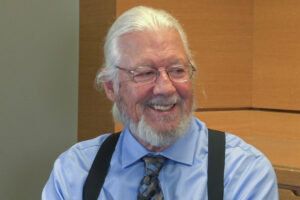Topic: Kansas-Colorado Arkansas River Compact

Interview of Dave Heinemann, January 18, 2021
Interviewed by Rex Buchanan
In this early 2021 oral history interview, former State Representative Dave Heinemann recalls the influences that led him to run for office to represent the Garden City area in Finney County, Kansas. He attributes familiarity with farming in southwest Kansas, where water availability is always a challenge, with his understanding of water issues. In this interview, Heinemann talks about the various perspectives from which Kansans evaluate local control of water use. As Chair of the Energy and Natural Resources Committee, Heinemann was able to see how attitudes about public policies regarding the environment frequently cut across party lines. Show More A prior oral history interview of Heinemann can be found in the Statehouse Conversations collection on this site. Show Less

Interview of Leland (Lee) Rolfs, October 28, 2019
Interviewed by Rex Buchanan
In this oral history interview recorded in 2019, Lee Rolfs explains that few regulations governed water use when he began working at the Division of Water Resources of the State Board of Agriculture in 1978. He describes how the State responded to depletion of the Ogallala aquifer by creating Groundwater Management Districts (GMD) to manage future development, and to create a comprehensive system to address water issues. Rolfs recalls how the policy positions switched over time from the State being reluctant to regulate groundwater use when the GMDs initially sought restrictions to the opposite, with the GMDs opposing regulations Show Morewhen the State sought to impose them. He recalls his work on ground-breaking litigation with Colorado over water in the Arkansas River (Kansas v. Colorado). That case spanned over 25 years of his career with the State. Rolfs expounds on the Water Appropriation Act and its importance in the development of Kansas and its limitations in addressing the issue of long-term declines in the water table. He observes that cooperation, knowledge, and education are essential for properly managing water in Kansas. Show Less
